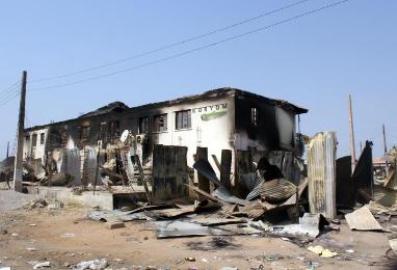Over 2,500 killed in Bor devastation: Jonglei MPs
January 21 2014 (JUBA) – At least 2,500 people have died Bor, the capital of South Sudan’s Jonglei state, following its three week occupation by rebels who have been fighting government for over a month, local MPs claimed after visiting the area on Tuesday.

The South Sudanese army (SPLA), backed by the Ugandan army and armed young men affiliated to the government forced the rebels to withdraw from the Bor last weekend.
Research organisation, the International Crisis Group has estimated that as many as 10,000 people have been killed in the conflict, which began in the capital Juba and has spread to Jonglei, Unity and Upper Nile states. The United Nations says that over half a million people have been displaced.
It was the fourth time the key town has changed hands since a large section of the army there defected just days after severe fighting in Juba, the South Sudanese capital, between soldiers loyal to President Salva Kiir and those who back his former deputy Riek Machar.
The members of parliament representing the constituencies of Bor South, Bor Central and Bor North, who visited the town using three small planes, said that the devastation is immense.
One of the MPs, June Malet, told Sudan Tribune in Bor that she had seen the bodies of “14 women killed in a church compound”.
The bodies of 32 patients, including 10 children, where also found in Bor civil hospital.
Later in the day Malet discovered that her mother, like many old people who either refused to leave or were not able to flee, had been killed in her home in Bor.
Nearly all elderly people people who refused to leave Bor before 31 December 2013 have been killed, according to government officials, who blame the rebels for the death of patients and old people.
These claims cannot be independently verified but Sudan Tribune did witness the 32 dead bodies which had been dumped in a small room at the hospital.
The leader of the investigation team, MP Deng, appealed to the government and international community to set aside funds for the reconstruction of Bor as well as Bentiu and Malakal, which have suffered a similar fate.
Dend said that this was the second time forces loyal to Riek Machar had been responsible for a massacre in Bor – referring to the 1991 incident which Amnesty International estimates killed 2,000 people.
The recent rebellion is the second time Machar has split from the SPLA. The first was in 1991 during the height of the civil war when the SPLA was itself a rebel group fighting the Sudanese government.
South Sudan achieved independence in 2011 following a 2005 peace deal, after which the SPLA became a national army and attempted to absorb South Sudan’s many other armed groups, including those who had been used by Khartoum to fight SPLA during the civil war.
Many of the soldiers who have mutinied over the last six weeks in Jonglei, Unity and Upper Nile were originally from groups that fought the SPLA during the civil war. In Bor the defection was led by Peter Gadet who has changed sides numerous times during the civil war and since South Sudan’s independence.
Despite achieving cessation from the Sudan many observers say that the new nation did not fully resolve the internal political and ethnic differences caused by decades of conflict.
Machar denies attempting to stage a coup against Kiir’s government but is now leading the rebellion against the government in which he served as Vice President from 2005 until he was sacked by Kiir in July 2011.
The President’s critics say he has become increasingly dictatorial and has tried to use the army infighting to silence his critics. Eleven senior members of the ruling SPLM have been detained for over a month accused of being part of the alleged coup attempt.
(ST)
